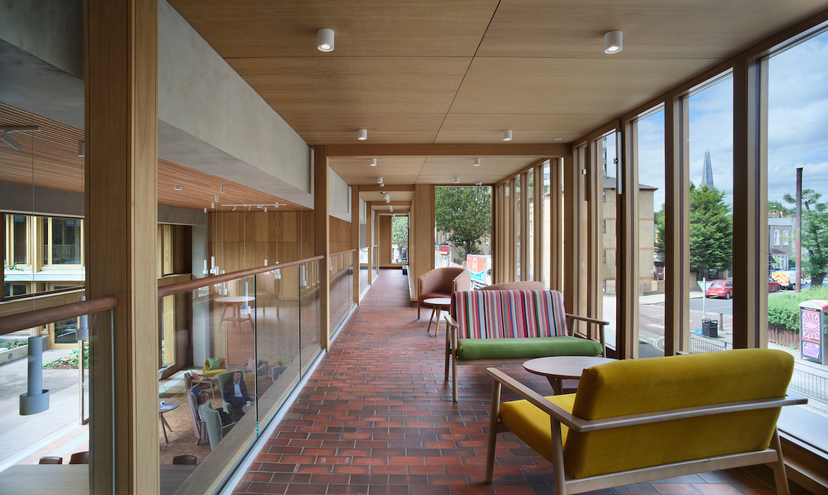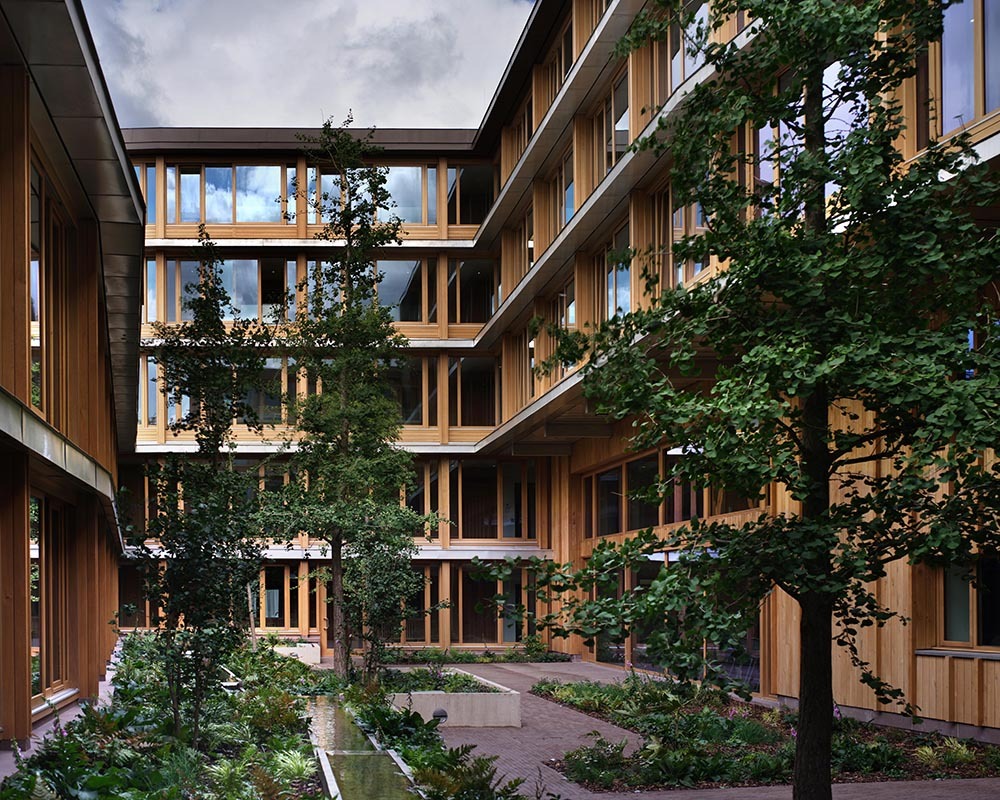Get updates from The Developer straight to your inbox Yes, please!
100th episode: Food and the architecture of a good life
The Developer Podcast celebrates its 100th episode with a special conversation hosted by leading thinker on food and cities Carolyn Steel about how we design spaces for dignity and sociability in an age of loneliness

The Developer Podcast celebrates its 100th episode with a special edition that sees author Caroyn Steel in conversation with guests Stephen Witherford, co-founder of Witherford Watson Mann architects and Sofia Craxton, food anthropologist and manager of the community kitchen at almshouse Appleby Blue.
What follows is a passionate and emotive discussion about how we design spaces for dignity, and the building as the beginning of a conversation about how we live and what we value.
Appleby Blue is a contemporary almshouse of older people’s social housing for United St Saviour’s Charity, named for one of its benefactors, Dorothy Appleby. Its 57 flats include 51 one-bedroom and 6 two-bedroom flats, with 11 of the homes being fully wheelchair accessible. The charity subsidises the rent, which is described on the website as being “well within Housing Benefit limits.”
Steel describes the building as feeling "like a luxury hotel, but this is supported housing."
The private charity’s new almshouse is now home to 63 residents. In a city where loneliness is one of the biggest killers, architect Witherford says the question was how to create an architecture that promotes the good life. While the movement of the sun, natural materials and a connection to nature were all considered important elements, part of the answer was to create spaces that “deinstitutionalise” the building through social interaction.
The traditional almshouse has been linked to greater longevity for residents, according to a study by the Bayers Business School, which analysed up to 100 years’ worth of residents’ records from a group of almshouses in England. The report found that almshouse living can boost longevity by years. Alison Benzimra, a co-author of the report, is head of research at United St Saviour’s Charity.
“It is well known that, on average, the lower a person’s socioeconomic status, the lower their life expectancy. However, intriguingly, our research has found that this doesn’t have to be the case,” writes co-author Professor Ben Rickayzen, Professor of Actuarial Science at Bayes Business School.
“We discovered that many almshouse residents receive a longevity boost when compared to their peers of the same socioeconomic status from the wider population. More research is needed to ascertain exactly what factors cause almshouse residents to have a longer life; however, we postulate that it is the sense of the community that is the most powerful ingredient.”
At Appleby Blue, the decision was made to use of food as an instrument for creating community, social cohesion and reduce isolation.
"Eating on your own and cooking for yourself can be one of the most soulless things, when you’ve lost people you spent time cooking and eating with," says Witherford. "We wanted to a place where people cook together and eat together and share their experiences."
Steel, who has spent her career writing about how food shapes our cities and social relationships, describes the almshouse as “something different and radical.”
“Where you might expect a desultory entry space,” Steel begins, “Instead, you’ve got this very generous, gracious, glazed ramp that goes up past a cheerily staffed residence office, and then most startingly to me, an enviably large and well-equipped community kitchen.”
“It’s all about creating community,” says Sofia Craxton, the food anthropologist and scientist who works at Applebly Blue as the Community Kitchen Manager. “Food is the glue that brings people together." Craxton is also in charge of the garden, where residents will be growing some of the food they’ll prepare.
Sociality is evident in other aspects of the design. In lieu of private outdoor space, there are courtyard gardens – an idea that Witherford developed in conversation with residents at other facilities. “We asked about their private balconies, and they said the last thing you want to do when you live on your own is to then go sit on a balcony on your own.”
Witherford’s response was to create more generous walkways and corridors that have seats, planters and views onto green spaces. “Ultimately this is all about how to get 65 or so residents to speak to one another in a way they can’t do when they live on their own,” says Witherford. “How do you build confidence and opportunities for people to share?”
“Food becomes just one vehicle, like a walk together, where it allows people to start to speak more openly about their experiences and their memories and things that matter.”
What Steel says resonates with her is “the idea that a building is a just the beginning of a conversation. It’s like an opening of a dialogue.”
“You’ve captured what Jane Jacobs was talking about when she described Hudson Street – this gradation of possibility from the private to the public,” says Steel to Witherford. “You can be out there having a beer and chatting to your mates, or quietly observing it from an upstairs window, or ignoring it all and listening to bird song. To have captured that range of possibility in a building of this scale is a remarkable achievement.”
Sign up to The Developer Weekly email to find out when new episodes of The Developer Podcast go live. You can get episodes early and our magazine when you support our podcast on Patreon at www.patreon.com/thedeveloperuk
If you love what we do, support us
Ask your organisation to become a member, buy tickets to our events or support us on Patreon
Sign up to our newsletter
Get updates from The Developer straight to your inbox
Thanks to our organisation members
Become a member
© Festival of Place - Tweak Ltd., 124 City Road, London, EC1V 2NX. Tel: 020 3326 7238


